- Home
- Joseph Bruchac
Sacajawea Page 6
Sacajawea Read online
Page 6
***
Three moons passed. Though the snow was still deep, the days were growing longer. Your motions inside my belly told me that you were restless. You wanted to start your own journey.
Your birth was not an easy one.
10. WILLIAM CLARK
Firstborn
11th February Monday 1805
about five Oclock this evening one of the wives of Charbono was delivered of a fine boy. it is worthy of remark that this was the first child the woman had boarn, and as is common in such cases her labour was tedious and the pain violent....
JOURNAL OF MERIWETHER LEWIS
FORT MANDAN, NORTH DAKOTA
NO, POMP, I WAS NOT THERE when you were born. But I remember it as clearly as if I were in the same room. Your mother and Charbonneau were living then in our quarters. We deemed it best for a young woman about to have her first child to be as close to us as possible. The best doctor for more than a thousand miles was Captain Lewis. Though Meri had not been trained as a medical man, he had studied hard for every possible problem along our way. Doctor Rush had prepared him well for every emergency. Already Captain Lewis had become famous as a physician among the Indians, who were always coming in for him to help them in some way to cure their ills. But I confess, lad, though he had foreseen flux and fevers, wounds and boils and pox, and the cutting off of frozen toes, none of us ever expected any of our little party to be giving birth.
Where was I? I was out with a hunting party. Our stock of meat was exhausted. With no meat in the camp and more than thirty hungry mouths, it mattered not that it was winter. I left, taking a good number of men with me. The first day, we walked more than thirty miles on the ice, and through points of land where the snow was more than knee-deep. And the hunting was not good. Even with twenty men to help me, we killed nothing on that first day. We were wet and hungry and we slept but little. The second day was both better and worse. I broke through the ice and got my feet and legs wet. But I sent four hunters through a point where I had seen the tracks of a deer. They killed a deer and two buffalo bulls. We butchered and ate that deer on the spot, but the buffalo were too meager to eat.
Though we did less well than we had hoped, we could not carry it all and had to cache a good stock of meat. So we came back for horses and sleds to bring the meat into camp. By the time I returned, the bottoms of my feet were blistered from walking on the uneven ice. All counted, we were out a full nine days.
Ah, your birth. Well, from what Meri told me it was not easy. That surprised me. I had fully expected you to come easily. Your mother had asked me to place my hand upon her belly so that I could feel you moving. Then she spoke with her hands. He is ready to run—I remember her saying. She was sure, by certain signs, that you were a boy. But her labor started in the morning and went all through the day with no sign that you were ready to deliver yourself into Meri's hands. Your mother asked for me, Meri said; she seemed to think that her son was waiting for my return. Even by then I had become the favorite in your mother Janey's eyes; the one she could rely upon.
"Out hunting," Captain Lewis said. "He will not be here."
Jessaume translated his words for her. Your father had absented himself from the room, troubled by your mother's pain.
"What can I do?" Meri said. He was not looking for an answer, but Jessaume had one.
"I have the remedy," Jessaume said. "If you have upon you the rattle of a snake."
Indeed, Meri did. As you know, Pomp, we were collecting specimens of every plant and new creature we saw along the way. Then the wise men of our people could see those things and learn. Among Meri's things was the rattle of a huge snake that had challenged him one day as we pulled in to the shore. Its challenge had lasted no longer than it took for Meri to end its career with his spontoon.
Jessaume took two rings from the rattle. He crushed them, mixed them into water, and gave them to your mother. As soon as she drank that potion, her pain eased. In less than ten minutes, you came into the world. Meri was much impressed and vowed to suggest that the doctors he knew conduct further experiments with this remedy when he returned to our homeland.
So it was that when I returned the next day from my long hunting trip, I found you waiting. You had been given the name of Jean Baptiste by your father. Your mother, Janey, in her own fashion and in her language, called you Pa-ump, Firstborn Son. And I called you Pomp.
11. SACAJAWEA
Charbonneau's Demands
Once there was a war among two of the bands of our people. It began with a small quarrel, but it grew larger. Neither side wished to give in, and many people died. At last the two groups of warriors met on a high hill. They were about to fight when a cloud of white smoke came swirling up toward them.
"Look there below us," said the chief of the first band.
"It is a sign from the Great Mystery," said the chief of the second band. "It means we should smoke the pipe of peace."
They went together to the place where the smoke rose from a bubbling spring. They sat together and shared the pipe of peace.
NO BABY COULD have been better than you. You hardly cried, even that first night. You were hungry, though. And when you were done eating, you yawned and went to sleep. You held tight to one of my braids with your small hand and slept. I was a woman of sixteen winters, and I was a mother.
"He is very wrinkled," Otter Woman said. I knew she was teasing me because she was happy for me. I knew, too, that she wished she had a baby of her own to keep. Everyone knew that before two more moons passed we would be leaving the fort. You and your father and I would go up the river with the two captains to find the Great Salt Water. Otter Woman would not be able to come along. She would be left behind—just as the many young women in the five villages who had hoped to travel with us would be left behind. I would be the only one.
"He is very wrinkled," Otter Woman said again. Yes, she was jealous of us both.
I smiled up at her. "His wrinkles are beautiful," I said.
***
Everyone came to see you. But it was not until our good captain came back from hunting that you smiled for the first time. You laughed, too. And when he reached his big finger down to touch your nose, you reached up and grasped his hand and would not let go. Then the two of you smiled and laughed together.
But we almost did not go on that great journey. Do you know why, Firstborn Son? Can you guess who it was who caused trouble? Think of how it is in our stories. Who is it who causes trouble when everything is going well for the people? Yes, Coyote is the one who does that. He is the one who does a good thing one moment and then a foolish thing the next, as if he cannot tell the difference between them. And who do we know like that? Yes, your father.
As I said, everyone knew we were to go with the captains. Everyone talked about it all the time. It was a great honor. It was exciting. It was the kind of journey that would give you stories you could tell for the rest of your lifetime. Wherever you went, people would ask you to tell those stories. The thought of the stories I could tell, though, meant less to me than going back home. I would be able to see the places I lived as a little girl. I would see the three rivers where I had been captured five winters before. Best of all, if they still lived, I might see some of my family again. I would be able to put my arms around them and hug them tight. That is our way, you know, Firstborn Son. More than any other nation, we Numi hug those we love and we hug those we meet. We hold them close so that our hearts are close together, so that our hearts are beating together.
Some were excited about our journey for other reasons. They were excited about what we could earn. Not just stories or honor, but land. Your father had heard that every man on the journey would be given the gift of a great piece of land. Each would receive the same grant of land that was given to the warriors who fought for the Americans in their great war against the British. That is how it is with the white people. They do not share their land with the other people in their nation. Each man holds his own piece of lan
d and defends it as if it is the food on his plate and he is starving. It is strange, but that is how it is. Your father, Charbonneau, he is not like that. He likes the idea of having land, but he likes to travel even more. Now he talks of settling down here in St. Louis, but he will not. I know him. Soon enough he will want to go up the river again, to trap beaver, to visit different places, to hear the stories there. It is not easy, but it is always interesting to be around your father.
***
People began to tell your father how important he was. The captains would not succeed without him. After all, his wife was the only one who could speak to the Snake Indians and help get horses. Without Snake horses, they would fail. Some of those who said these things to your father were jealous or worked for the English company. They hoped to cause trouble and make it more difficult for the captains to succeed. So your father did a foolish thing. He went to the captains and spoke to them in this way:
"The terms you offer me," he said, holding his arms wide open, "they are no good. I will not be your interpreter and bring my wife with me unless the terms are different. I will not stand a guard, non And if I am miffed with any man, I must have the right to return as I please with as many provisions as I wish to carry. That is how my terms must be."
Then he folded his arms and waited for their agreement.
The two captains looked at each other with raised eyebrows but said nothing. Then they turned back to Charbonneau. Captain Lewis spoke.
"Your demands are inadmissible," Captain Lewis said. "Our engagement was only verbal. Monsieur Gravelines will be our interpreter. You may be off and take your family with you."
***
The story of what had happened reached me before your father did. When he arrived I had already packed our things and I was walking toward the river with you in my arms. I said nothing to him. In fact, I said nothing to anyone except you, my son, the four days we spent in the Mandan village of Mitutanka, on the west bank of the frozen river. My silence troubled your father more than any complaints or angry words. When a man has been foolish, it is sometimes better to let him think of what he has done. If you tell him he is wrong, that just makes him more stubborn about it.
At first your father walked back and forth, waving his arms and complaining about the injustice of it. Was it not known that no one could translate as he, Toussaint Charbonneau, could? How could they speak to the many nations along the way without him? To interpret is great work, hard work Why should they expect him to stay awake at night, keeping watch, when he needed to sleep so that he would be wide awake and ready to help them in the difficult job of translating? By the second day he was stating loudly that their journey would never succeed. It was better we did not go with them. They would all be killed by the Blackfeet or the Nez Percé. By the third day he was acting sad, asking why it was that the captains should dislike him so much—him, Toussaint Charbonneau, who only wished to be helpful to everyone. By the fourth day he was as silent as I was.
He sat for a long time, his chin in his hands, looking at the frozen river. Then he looked at me. Though I had spoken no word of criticism, he understood my silence. He came over to me, went down on one knee, and placed his hand gently on my shoulder.
"You wish to make this journey, is that not so, ma petite?" he said in a voice much smaller than usual.
"It is so," I said, surprised at how loud my own voice was in answering him.
"Then this foolish man shall do what he must do."
***
Jessaume carried your father's words to the captains. Your father was sorry for the foolish part he had played. If the great captains Clark and Lewis pleased, he would accompany them, agreeable to the terms they had proposed. He would do everything they wished him to do. Would they excuse his simplicity and take him back into their service?
The next day we were called to return to Fort Mandan, where your father signed a written agreement and was officially enlisted as an interpreter.
12. WILLIAM CLARK
Departures
April 7th 1805
Sunday, at 4 oClock PM, the Boat, in which was 6 soldiers 2 frenchmen & an Indian, all under the command of a corporal who had the charge of dispatches & c.—and a Canoe with 2 french men. Set out down the river for St. Louis. at the same time we sout out on our voyage up the river in 2 perogues and 6 canoes, and proceeded to the 1st villag. of Mandans & Camped on the S.S.—our party consisting of Sergt. Nathaniel Pryor Sgt. John Ordway Sgt. Pat: Gass, William Bratten, John Colter Joseph & Reubin Fields, John Shields George Gibson George Shannon, John Potts, John Collins, Jos: Whitehouse, Richard Windsor, Alexander Willard, Hugh Hall, Silas Gutrich, Robert Frazure, Peter Crouzat, John Baptiest la page, Francis Labich, Hugh McNeil, William Werner, Thomas P. Howard, Peter Wiser, J.P. Thompson and my Servent York, George Drewyer who acts as a hunter & interpreter, Shabonah and his Indian Squar to act as an Interpreter & interpretess for the Snake Indians--one Mandan & Shabonah's infant. Sah-kah-gar we a
JOURNAL OF MERIWETHER LEWIS
FORT MANDAN, NORTH DAKOTA
THERE WAS NO DOUBT that spring was in the air, Pomp. Every day, even in the dead of winter, we had always had a steady stream—some days a flood—of Indian visitors. But then none at all came to the fort.
Why? we asked.
Because of the buffalo, Charbonneau said.
We went out to see. The ice had broken on the river, and the river had risen more than a foot in height. Here was a sight like no other. During the winter, when the buffalo herds crossed from one side to the other on the ice, betimes the ice broke, and many fell in to drown. Now their great frozen bodies were floating down the river. With extraordinary dexterity, the Indians were leaping from one small cake of ice to another, to catch those buffalo as they floated down.
The air was filled with smoke. Walking up to the rise on which the village stood, we looked in both directions and saw another sight. The Mandans had set fire to the grass on both sides of the river, and the whole prairie was ablaze. They did this every year, your mother told us through signs. It provided fresh grass for the horses and brought in the herds of buffalo.
Geese and ducks were flying up the river in huge flocks. We could hear them calling in the night. All our party was in high spirits. In a few days we would begin the next part of our great voyage.
***
The day we chose to depart was Monday, April 7. At 4:00 P.M. we sent the keelboat back down the river. Your father and mother—and you, a baby held in your mother's arms—would be the only new additions to our Corps of Discovery. The three of you were with us that day on the riverbank as we watched the boat depart for St. Louis, carrying the only two of our original party who had not joined in our spirit of adventure: former privates Newman and Reed. Those two men, both much reformed; Corporal Warfington and four other privates; Mr. Gravelines, who served as both the river pilot and interpreter; and four Frenchmen made up the group that was going back to St. Louis. Captain Lewis had but little doubt that they would be attacked by the Sioux on their way down the river. But they pledged themselves, to a man, never to yield while there was a man of them living. They carried a critical cargo with them.
And what was in that cargo, Pomp? Our letters and reports, for one. And for another, nine boxes filled with wonderful things to be taken to the president of the United States. I have the list here. The skins and skeletons of such new creatures as the antelope, the mule deer, burrowing squirrels; the small burrowing wolf from the prairie—though its skin was lost by accident—horns of the mountain ram; a buffalo robe representing a battle between the Mandans and Minnetarees against the Sioux and the Arikaras; the skin of a yellow bear I obtained from the Sioux, a great bear of a sort we had yet to see; specimens of plants, insects, and mice; and cages containing a living burrowing squirrel of the prairies, four living magpies, and a living prairie hen. We had no doubt that such things would thrill President Jefferson, what with his great enthusiasm and curiosity for everything of a scientific sort.
***
Were the rest of us fearful before we set out up the river? Perhaps we might have been. The unknown lay ahead of us. All contact with the civilized world would now be left far behind. Should disaster overtake us, we might vanish into that great unmapped wilderness without a trace. Yet all we felt was excitement. There was perfect harmony and good understanding among us. Such harmony and understanding I have never seen again in any group of men like our small party of adventurers. My dear friend Meri felt just as I did. We were about to voyage into the unknown.
He grasped me by the shoulder as we stood watching our men ready the boats for our departure. We looked at our little fleet of six small canoes and the two large pirogues.
"Billy," he said with a smile, "behold our little fleet."
"Not quite as respectable as Columbus," said I.
"Nor Captain Cook," Meri replied with a laugh. "Think of it. We are about to penetrate into a country two thousand miles wide, on which the foot of civilized man has never trodden. All the good or evil it has in store is for experiment yet to determine. Those little vessels of ours contain every article by which we are to expect to subsist or defend ourselves. Yet I do believe we shall succeed."
"And I believe the same," I said, my smile as broad as his.
***
We took an early supper. That night we chose to sleep in a tent made in the Indian style, of the dressed skins of buffalo. Setting up the tent was your mothers responsibility, and she made it seem an easy one. I saw her do it many times in the months to come. The twelve poles raised and attached at the top in almost no time, other poles leaned in, the leather covering thrown over to make a cone. Inside that buffalo-skin lodge, your uncle Captain Lewis, George Drouillard, and I slept toward the front. At the back of the lodge, across the fire from us, were you, your father, and your mother. We were a little family within that lodge, and no man in our party ever showed anything less than perfect respect to your mother, though she was the only woman with us. Those sleeping arrangements were exactly as they would be for almost every night from then on until we reached the ocean.

 Peacemaker
Peacemaker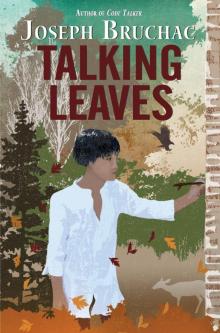 Talking Leaves
Talking Leaves Found
Found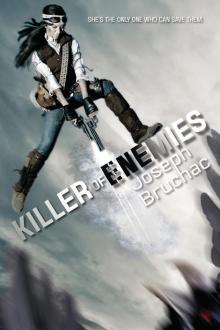 Killer of Enemies
Killer of Enemies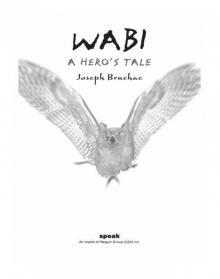 Wabi
Wabi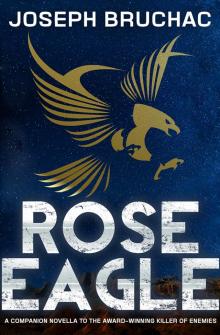 Rose Eagle
Rose Eagle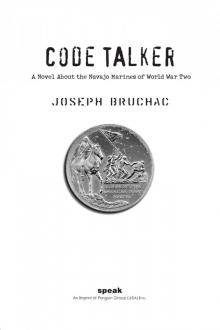 Code Talker
Code Talker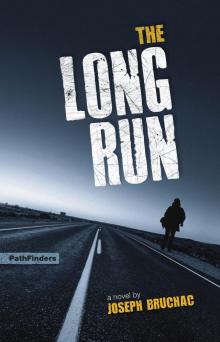 The Long Run
The Long Run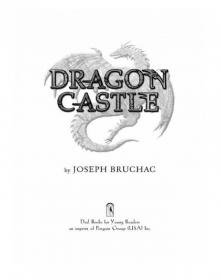 Dragon Castle
Dragon Castle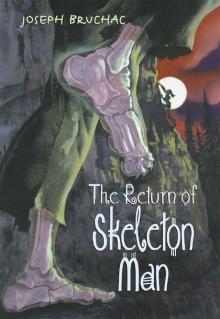 The Return of Skeleton Man
The Return of Skeleton Man Pocahontas
Pocahontas Whisper in the Dark
Whisper in the Dark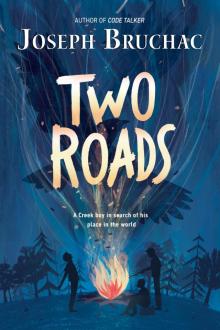 Two Roads
Two Roads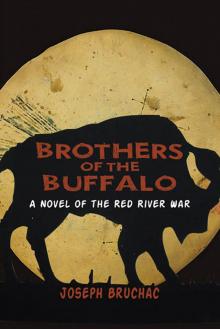 Brothers of the Buffalo
Brothers of the Buffalo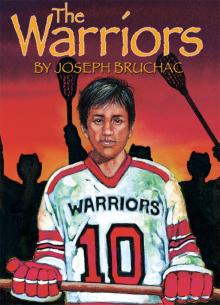 The Warriors
The Warriors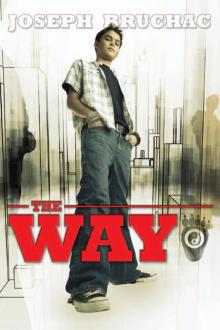 The Way
The Way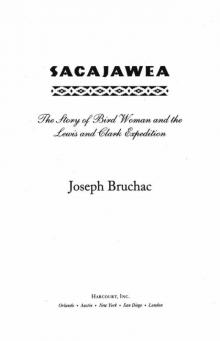 Sacajawea
Sacajawea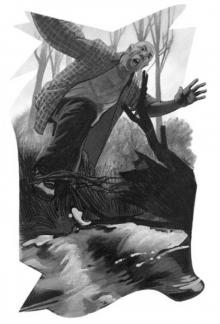 Night Wings
Night Wings March Toward the Thunder
March Toward the Thunder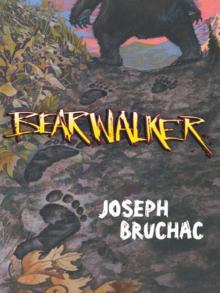 Bearwalker
Bearwalker Skeleton Man
Skeleton Man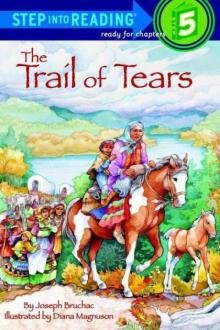 The Trail of Tears
The Trail of Tears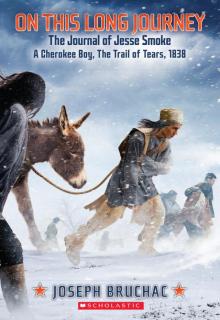 On This Long Journey
On This Long Journey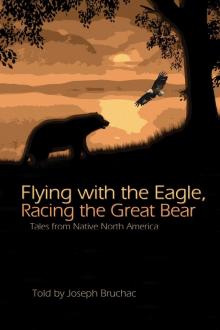 Flying with the Eagle, Racing the Great Bear
Flying with the Eagle, Racing the Great Bear